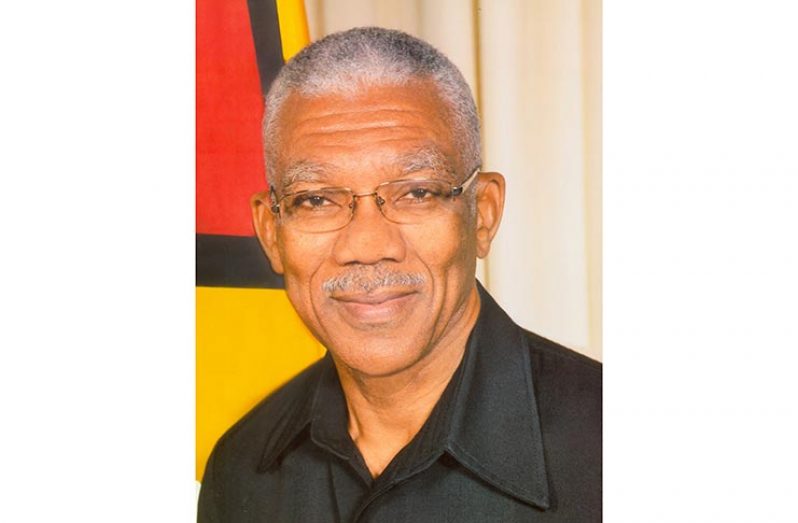…but President says no to industrialisation
By Svetlana Marshall in Jamaica
CUSTODIAL sentences for the possession of small amounts of marijuana in Guyana are likely to be removed in the not so distant future but industrialisation of the cannabis is a no, no for the Guyanese Government.
Moments before attending the first Plenary Session of the 39th Regular Meeting of the Conference of Heads of Government of the Caribbean Community (CARICOM) at the Montego Bay Convention Centre in Jamaica on Thursday, President David Granger told the Guyana Chronicle that though issue of the decriminalisation of marijuana has not been finally settled at the level of Cabinet, he hinted that amendments are likely to be made to the Narcotic Drugs and Psychotropic Substance Control Act to allow for the removal of jail time for the possession of small amounts of marijuana. “We are moving towards the removal of custodial sentences for the possession of small amounts of marijuana,” he told this newspaper.
However, he made it clear that his Government will not be pushing for the industrialization of marijuana production. “We are not moving towards encouraging the industrialization of marijuana production.
I think that is a little premature in the context of Guyana, and we have vast landscape in comparison with some of the Caribbean Island states, we have challenges for enforcement and challenges for control of that land space, and it will be very difficult for Guyana to embark on that course at the present time. So we are moving towards the removal of the custodial sentences, we are not moving towards the encouragement of the use of marijuana,” President Granger explained.
Over the years, several persons have been placed behind bars for having small amounts of marijuana in their possession– a move which has been frowned upon, given the overcrowding of the country’s prisons. Once found in possession of more than five grams of cannabis, a person can be sentenced to three years in jail.
His comments come at a time when the CARICOM Heads of Government are considering the recommendations tabled in the Report of the Regional Commission on Marijuana, which, to a large extent, calls for the decriminalization of the marijuana across the 15 Member States but in regulated amounts.
On Monday, while at the Jamaica Pegasus, CARICOM Secretary-General, Ambassador Irwin LaRocque said the 10-member commission – which is made up of experts in the fields of medicine, medical and social research, law, education, psychiatry and criminology – analyzed the social, economic, health and legal issues surrounding marijuana use, and made some far reaching recommendations with regards to the decriminalization of the cannabis.
The recommendations are also based on extensive consultations in Antigua and Barbuda, Barbados, Belize, The Bahamas, Guyana, Montserrat, St. Kitts and Nevis, St. Vincent and the Grenadines and Suriname.
“They are recommending the decriminalisation of marijuana. They are recommending that it be deemed a substance that is controlled and managed as alcohol,” the Secretary General said while noting, however, that there is some concern about controlling it in terms of youth and adolescent use. In the report, the commission also made a case for legislation to be put in place to allow for research on medical marijuana.
Ambassador LaRocque told Guyana Chronicle that in compiling the report, the commission led by Professor Rosemarie Belle-Antoine took into consideration existing laws in some Member States that are cause for concern.
“One thing that I read in the report that stands out in my mind so much is that there are in some Member States where the penalty for a small amount of marijuana is sometimes more than some of the other more heinous crimes in the community. Now how can that be? How is it that you can have a youth with a small amount of marijuana or anybody, with small amounts of marijuana and the penalty for such a thing is higher,” Ambassador LaRocque reasoned while noting that it defies logic.
Not bound
In Guyana, the Attorney General and Minister of Legal Affairs, Basil Williams said the country is not bound to adopt the recommendations made by the CARICOM appointed Commission on Marijuana. “When I met with the Rastafari community, they were saying they wanted to be able to walk around with 53 grams, so the society must be able to have a debate on these issues,” Williams said while reiterating that his position.
“I have chaired the Legal Affairs Committee of CARICOM and matters come and different countries take different positions on them. Some issues are there before CARICOM for 10 years because other countries do not sign on,” he remarked. The Attorney General reminded that Guyana as a country within the regional bloc is governed by its own rules, while noting that before a position is taken, there must be massive consultations.
Williams believes that alternative sentencing should be employed by magistrates, while noting that through his ministry, a US$8M loan has been granted to examine the prison population.
Nonetheless, the President’s announcement on Thursday is consistent with calls made by the Alliance for Change (AFC). The party, which forms a major part of the coalition government, said it is time legislators move with alacrity to upgrade the laws of Guyana to ensure that custodial sentences for small quantities of marijuana are removed from the books in their entirety.
“Custodial sentences serve, in large measure, to criminalise young people, particularly young men who have been caught with small quantities of marijuana – an offence which is a mere error in judgment and not representative of criminal behaviour,” the AFC said earlier this year.
AFC Member of Parliament, Michael Carrington, since 2015 had tabled a bill in the National Assembly for debate but it has since been languishing on the order paper, being deferred time and time again. The Guyanese Rastafarian Council is also advocating for marijuana-related laws to be reformed, contending that the Rastafarian community uses the herb for religious and meditative purposes.




.png)









